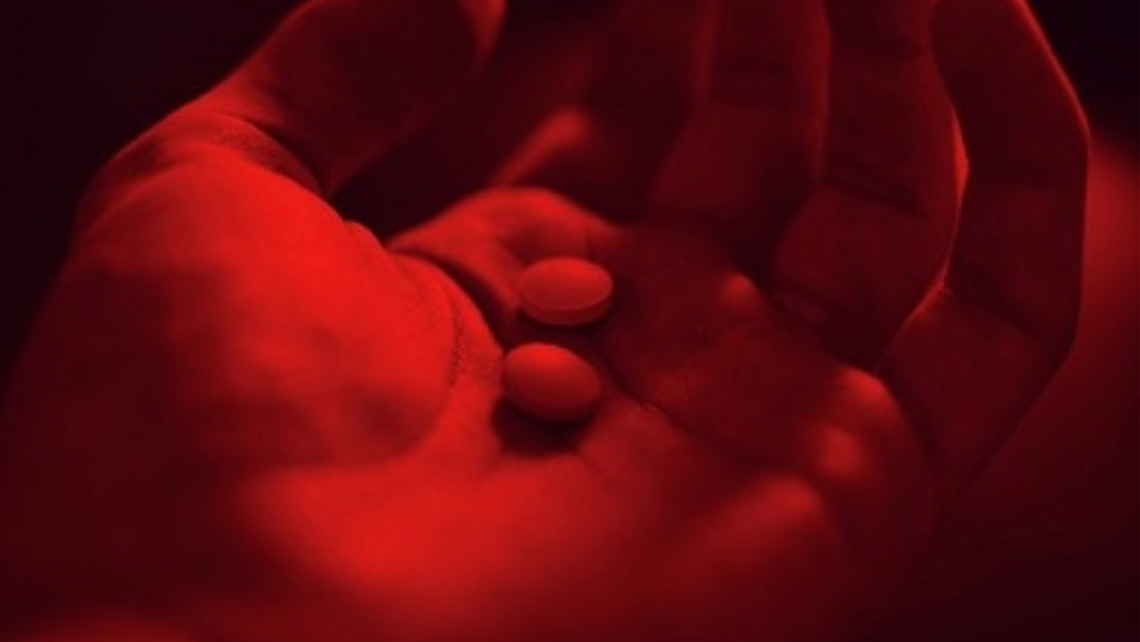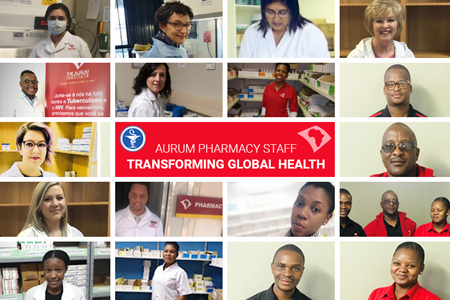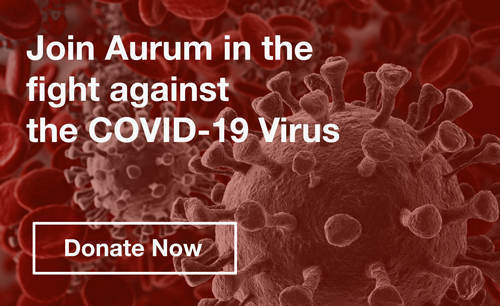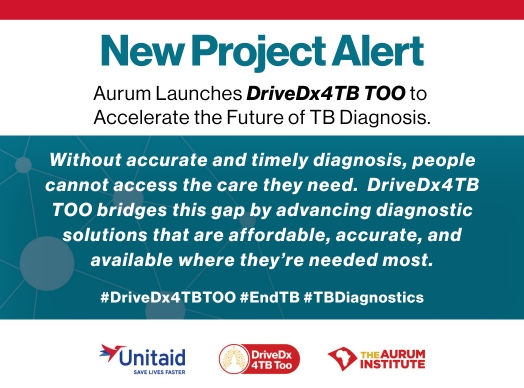Three-month regimen expected to prevent TB in those at highest risk of developing the disease, including people living with HIV and children under the age of five
Today, the Aurum Institute and its partners, as part of the IMPAACT4TB project, announced that five high-burden TB countries will roll out a new, shorter drug regimen (known as 3HP) to prevent TB. The announcement comes as countries around the world mark World TB Day, which takes place every year on March 24th. Countries that will initially provide the new regimen with funding from Unitaid, U.S. PEPFAR and the Global Fund include Cambodia, Ethiopia, Kenya, Malawi, South Africa and Zimbabwe. More than 120,000 patient courses of 3HP will be delivered by the project to 12 countries in 2020. An additional 1 million patient courses are expected to reach low- and middle-income countries by the end of the year, through the combined support of Unitaid, Global Fund, the Stop TB Partnership’s Global Drug Facility (GDF) and PEPFAR.
The new regimen consists of three months of rifapentine and isoniazid treatment. The previous standard of care—isoniazid preventive therapy (IPT)—was long and complex, with people required to take a pill daily for six to 36 months. The 3HP regimen, taken only once a week for 12 weeks, offers numerous benefits for infected individuals, clinicians and programs. Evidence shows that it’s as effective as IPT in preventing progression to active TB disease, has fewer side effects, more patients complete the regimen and is easier for patients to take.
“Effective TB prevention will be a game-changer in the global fight to eliminate tuberculosis,” said Robert Matiru, director of programmes at Unitaid. “This new, shorter regimen, which has until now been unaffordable, offers a great opportunity to turn the tide against TB and protect those who are at highest risk. Preventing this deadly, airborne disease is even more important at a time when the entire world fights to control the threat of COVID-19 and where health systems are being stretched beyond their limits.”
TB remains the world’s deadliest infectious disease. In 2018 alone, 10 million people fell ill from the disease which killed around 1.5 million people, over 95% of whom were living in low- and middle-income countries. TB can lie dormant for decades before it strikes; this is called “latent TB.” People with latent infection—almost a quarter of the globe—have no symptoms, are not contagious and most of them don’t know they are infected. If left untreated, latent infection can develop into active TB, the form of TB that makes people sick and is capable of being transmitted from one person to another.
“This is an exciting new step in the fight to end TB, as it is safer, shortens the duration of preventive therapy and provides more options for those at highest risk of developing active TB,” said Dr Tereza Kasaeva, Director of the Global TB programme at WHO. “WHO, through its regional and country offices, is committed to support scale-up of TB preventive treatment in countries to achieve the UN HLM targets. These countries will pave the way for 3HP rollout in other TB high burden countries.”
During this first phase, 3HP will first be given to those at highest risk of progressing from TB infection to TB disease, notably people living with HIV (PLHIV) and children under the age of five. People living with HIV are 20 to 37 times more likely to move from latent to active TB than those without HIV infection. Often, their infection goes unnoticed until it’s too late, and as a result people being successfully treated for HIV are now dying from TB.
At the UN High-Level Meeting on TB in 2018, world leaders committed to providing TB preventive therapy to at least 30 million people, including 6 million people living with HIV, by 2022, 4 million children under 5 years and 20 million household contacts.
“Children up to five years of age are at highest risk of progressing from TB infection to disease, yet only about 25% of those who are eligible for it start TB preventive therapy,” said Dr Matteo Zignol, Unit Head a.i., TB prevention, diagnosis, treatment, care and innovation, WHO Global TB Programme. “The scale-up of 3HP among these vulnerable populations will go a long way towards not only saving lives, but also reducing the overall burden of TB disease.”
In October 2019, Unitaid, the Global Fund and Sanofi announced a new price agreement for rifapentine (Priftin®), which drastically discounted the price of 3HP. The agreement with Sanofi lowered a patient treatment course of Priftin® from $45 to $15 (a 66% discount). The discounted price was made available to the public sectors of low-income countries, lower-middle income countries and upper-middle income countries with a high burden of TB and TB/HIV.
“As of 2018, only 65 countries reported initiating 1.8 million people living with HIV and around 350,000 children under the age on TB preventive therapy—well below the targets set at the UN High-Level Meeting on TB which took place in September 2018,” said Gavin Churchyard, founder and CEO of the Aurum Institute. “Until recently, price remained a key barrier to scale-up of short course regimens such as 3HP. Now that this barrier has been removed, it’s time to get serious about preventing TB, particularly during the SARS-CoV2 pandemic, as there is some evidence to suggest that active TB may worsen the clinical outcome of Covid19 disease.”
“Unitaid is committed to establishing a healthy market for TB preventive therapy, in line with the political commitments made at the UN high-level meeting on TB,” said Philippe Duneton, Unitaid Executive Director a.i. “Moving forward, we intend to support the entry of at least one more generic supplier of the FDC, as well as other rifapentine-based formulations, including for children.”
“This is only the first step, and in the coming months the Aurum Institute and its IMPAACT4TB partners will be working to roll out 3HP to all 12 of its project countries, which represent almost 50% of the global TB burden,” said Karin Kanewske Turner, Director of the IMPAACT4TB Project, from the Aurum Institute.
To request an interview, or for more information, please contact:
Kanya Ndaki, This email address is being protected from spambots. You need JavaScript enabled to view it. +27 832986100
Anne-Marie Schryer-Roy, This email address is being protected from spambots. You need JavaScript enabled to view it., +254727305525
Notes for Editors
About Aurum
Established in 1998, the Aurum Institute is an African Public Benefit Organisation whose mission is to improve the health of people and communities living in poverty through innovation in global health research, systems and delivery. It is rooted in Africa is dedicated to researching, supporting and implementing innovative, integrated approaches to Global Health with their headquarters in South Africa with offices in the USA, Ghana and Mozambique. The Aurum Institute has developed itself into a leading player, bridging the worlds of research, policy and implementation for impact. www.auruminstitute.org
About IMPAACT4TB
Unitaid is investing US$59 million in the Aurum Institute’s IMPAACT4TB project, to protect people most vulnerable to developing active TB. The four-year grant will prioritize short-course TB preventive therapy for people living with HIV and children under five, and subsequently all those in close contact with TB patients in 12 high-burden countries. The target groups will receive a quality-assured, affordable short-course TB preventive therapy known as 3HP, consisting of high-doses of two antibiotics that treat TB (isoniazid and rifapentine given weekly for three months). www.unitaid.org and www.impaact4tb.org
South Africa’s Aurum Institute is spearheading the TB prevention project and is working with the Clinton HIV/AIDS Access Initiative, KNCV Tuberculosis Foundation, and John Hopkins University, in collaboration with the World Health Organization (WHO) and the Global Drug Facility (GDF).
About Unitaid: Unitaid brings the power of new medical discoveries to the people who most need them and helps set the stage for large-scale introduction of new health products by collaborating with governments and partners such as PEPFAR, the Global Fund and WHO. Unitaid invests in new ways to prevent, diagnose and treat diseases including HIV/AIDS, hepatitis C, tuberculosis and malaria more quickly, affordably and effectively. A growing number of our programs address more than one disease, maximizing effectiveness of health systems.












